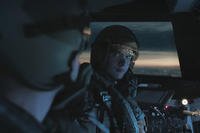Before he was the voice of Darth Vader, Mufasa in "The Lion King" or even the voice of CNN -- and long before he was frocked as Vice Adm. James Greer in the early "Jack Ryan" movies -- James Earl Jones was a Cold War-era Army officer. Oddly enough, he also got his silver-screen debut in one of the most legendary movies of the Cold War.
"Major Kong, is it possible this might be some kind of loyalty test? You know, give the go code and then recall to see who would actually go?"
Jones, as Lt. Lothar Zogg, delivers this line during the first 10 minutes of "Dr. Strangelove or: How I Learned to Stop Worrying and Love the Bomb," the legendary Cold War film that follows a rogue Air Force general who wants to start a nuclear war against the Soviet Union. Zogg, a member of a B-52 bomber crew on its way to drop a nuclear weapon, utters the line, because he (like everyone else in the film) can't believe a launch order was actually given.
Zogg was the first time America heard James Earl Jones' now-legendary baritone on the screen, and the tiny role marked the start of the actor's illustrious 60-year career in film and television.

Zogg doesn't have many lines in Stanley Kubrick's 1964 film, but Jones didn't know that when he signed on to portray the bombardier. The script he received was "full of Air Force techno-jargon."
"In the original script, the bombardier's role included pointed questioning of the authenticity of Gen. Ripper's command-orders to nuke Russia," Jones recalled in a 2004 Wall Street Journal retrospective. As the script was increasingly rewritten as satire, Zogg's role grew shorter and shorter. He wasn't thrilled about having fewer lines, but Jones was still excited to be in the movie.
"I felt very fortunate to be working with Kubrick, one of the most brilliant and innovative directors of our time," he wrote.
It might have been a small part, but the cast of director Kubrick's brilliant Cold War satire was filled with heavy hitters. He joined actors Peter Sellers ("The Pink Panther"), George C. Scott ("Patton"), Sterling Hayden ("The Godfather") and, of course, Slim Pickens ("Blazing Saddles").
Kubrick met Jones when the former was scouting George C. Scott for the role of Gen. Buck Turgidson, as Scott and Jones were in a New York City performance of "The Merchant of Venice" together at the time. Jones was initially offered the part because Kubrick wanted to make the B-52 bomber crew in the film a multiethnic one, he recalled.
This was nothing new for Jones, having served in the Army as an officer during the Korean War, the first war that featured a racially integrated U.S. military.
"I had served during the Korean conflict as a member of the first fully integrated officer corps in U.S. military history," he wrote. "There were fellow officers I encountered, from the unreconstructed South, who couldn't quite bring themselves to shake my hand."
Jones recalled Kubrick being polite and "even-tempered" on set. But even he eventually caught the director's cold shoulder when the actor couldn't remember all of his Air Force jargon during filming.
"I had learned the lines," Jones recalled. "But in the weeks of waiting around to shoot the scene, I had forgotten them, and Kubrick said, 'You mean you don't know your words?' He momentarily stopped chewing his gum and then said very coldly, 'Let's move to the next set.' I felt uncomfortable with him afterward."
The Korean War was long over by the time production of "Dr. Strangelove" began, and the war in Vietnam was heating up. Jones never considered rejoining the Army. Instead, he continued his film and television career. His breakout role came in 1970 as boxer Jack Jefferson in "The Great White Hope." From there, he became a part of the American cultural lexicon through his many iconic roles.
On top of his previously mentioned parts, Jones starred opposite Arnold Schwarzenegger in 1982's "Conan the Barbarian." He was in Eddie Murphy's 1988 comedy classic "Coming to America." Who could forget the big reveal at the end of 1993's "The Sandlot," when Jones, as Mr. Mertle, retrieves the ball for the gang?

Jones died on Sept. 9, 2024, at age 93. He was a distinguished U.S. Army veteran who helped pioneer the integration of the armed forces, as well as an EGOT (Emmy, Grammy, Oscar, Tony)-winning actor whose roles ensure his memory lives forever in American popular culture. More importantly, however, he should be remembered as the man who teed up one of the most famous scenes in military movie history: "Hey, what about Major Kong?"
Keep Up With the Best in Military Entertainment
Whether you're looking for news and entertainment, thinking of joining the military or keeping up with military life and benefits, Military.com has you covered. Subscribe to the Military.com newsletter to have military news, updates and resources delivered straight to your inbox.

















